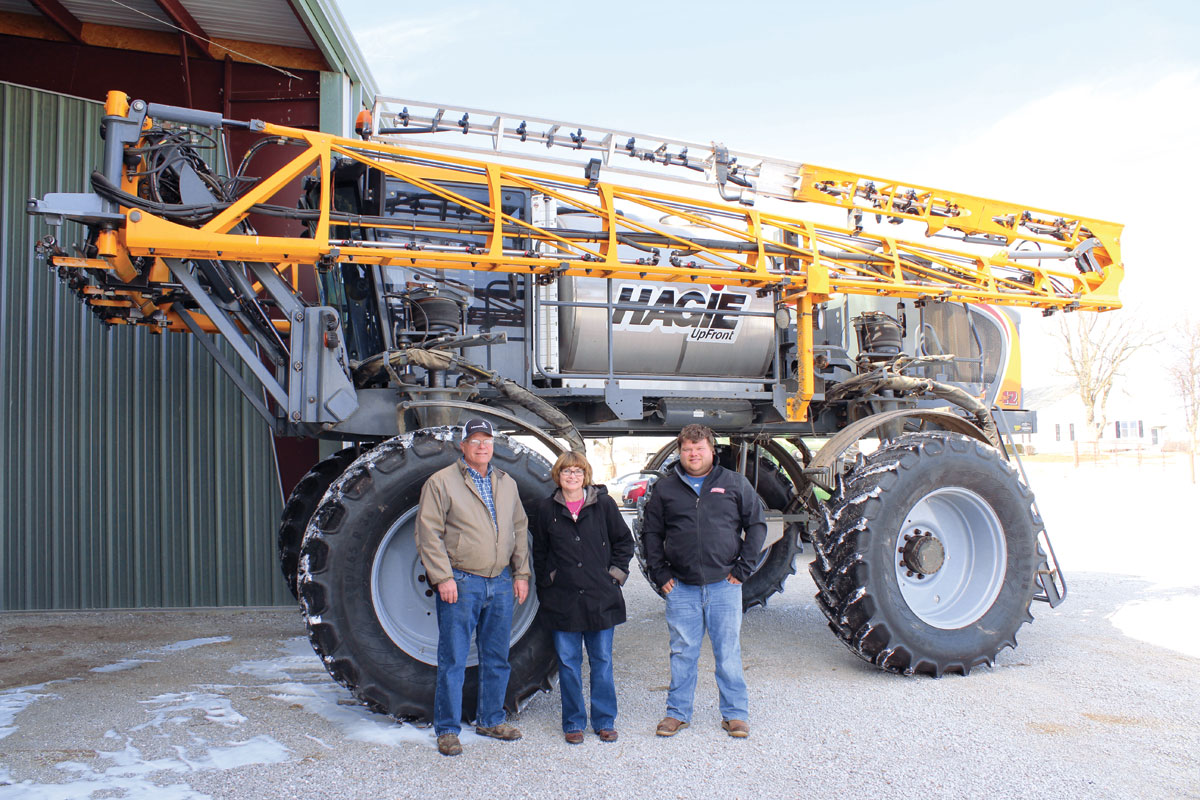
Family overcomes changes to carry on their agriculture tradition
One of the first ingredients on the nutrition label of a box of cake or cookie mix is usually enriched wheat flour. Have you ever taken a moment to consider the story behind the flour in the mix? Who planted the seeds? Where was the wheat grown? There’s a chance that flour began its journey at Fischer Farms in Rockville, Mo.
Fourth-generation farmers, Kevin and Mary Fischer, along with their middle son Brice and his wife Ashleigh own and operate Fischer Farms, a row crop and beef cattle enterprise in Bates County.
The dynamics of Fischer Farms have changed over the years but one thing remains the same, it’s still family owned and operated. The farm has been passed down through the generations since 1886. Prior to World War II, Kevin’s dad, Clarence, and his uncle, Arnold Fischer, took the reins of the operation. In 1980, Clarence and Arnold dissolved their partnership so Clarence could farm with his sons, Kevin and Ivan.
“My brother and I fed cattle and had a farrow-to-finish operation with about 600 pigs per year. We stopped raising hogs in 1995 and stopped feeding cattle in 2003,” Kevin explained.
In 2012, Fischer Farms faced another change to allow Kevin and Brice to farm together.
“The good thing I could say about all those divisions is we are still on good terms and on good speaking,” Kevin remarked.
When Kevin and Brice partnered in 2012, they were farming 800 acres. Fast forward to 2019 and they are farming 1,400 acres where they grow soft red winter wheat, soybeans and corn. They have 375 acres of pasture and hay ground. They run 135 head of commercial Angus cow/calf pairs. They retain 20 to 25 replacement heifers per year and background the remaining calves to 800 pounds before they are sold at the local sale barn.
The wheat grown at Fischer Farms is processed into baking flour for cake and cookie mixes. The corn is sold and fed to laying hens in Southwest Missouri and their soybeans are processed into soybean meal and biodiesel.
Since Brice joined the operation, they have incorporated a variety of agriculture technologies, which have allowed them to save time, money, and increase crop yields and soil fertility.
They have installed auto steer on all of their tractors, sprayer and combine. This technology ensures straight rows and an even fertilizer application. It also saves time and money by preventing fertilizer overlap in the field. It allows their farm hands to safely and successfully operate the equipment. It makes it easy for Mary to lend a hand driving tractors during planting and harvest.
“Auto steer is like turning on electricity in your house at night, it allows you to run later in the evening, when you can’t visually see your planter marker or the edge where you were working ground,” Kevin said.
The Fischers use section control technology on their planter, fertilizer applicator, sprayer and combine. This reduces overlap and over-application of seed, fertilizer and chemical.
“It automatically shuts off where we have planted or where we have sprayed. In the combine, it won’t collect data where we have already harvested. It kicks it on and off on its own,” Brice explained.
Prior to Brice joining the operation, the Fischers blanket spread their row crop acres with a straight rate of nitrogen, phosphorus and potassium. Now they use variable rate technology, which allows them to precisely apply the exact nutrients that are needed and reduces over application to the acre.
“We grid soil sample on 2 1/2 acre grids. We use the yield data from our combine along with the soil data we collect through grid sampling to determine the amount of fertilizer needed per grid,” Brice said.
The Fischers will collect this data for four years and use it to determine precisely how much fertilizer or lime is needed per two and a half acres.
“On the ground we have had large yields, we apply more fertilizer back to the soil. Where we had lower yields, we increase the amount of fertilizer in that area. We would like to see all of our ground at peak performance at the end of this four years,” Brice exclaimed.
The Fischers recently installed physical scales to their fertilizer wagon. The scales and the computer monitoring system are calibrated to work together to precisely apply the fertilizer at the correct rate.
“You can get within 100 pounds on 100 acres of fertilizer,” Brice said.
These technologies provide a wealth of useful data, reduce input costs, and are environmentally friendly.
“We are not putting fertilizer down that the ground can’t hold and is being leached away. We are only putting down what the soil profile has the ability to hold,” Brice said.
Kevin and Mary farm full-time and are active members of Missouri Farm Bureau (MOFB) and have served on the Bates County Farm Bureau board of directors for 20 years. Mary currently serves on the MOFB State Board of Directors and is the chair of the State Promotion and Education Committee. She is the vice chair of the American Farm Bureau Federation (AFBF) Promotion and Education Committee and is a member of the AFBF GO Team, a grassroots legislative outreach team.
Aside from farming, Brice is a seed dealer for Pioneer Hi-Bred. His wife, Ashleigh is a preschool teacher at Zion Lutheran School. Brice is a 2006 graduate from the University of Central Missouri with a bachelor’s in agriculture technology.
Kevin and Mary have two other sons – Carlie Fischer and his wife Katie and son Cooper, and Nolan Fischer and his wife Kayla and their daughter Becket. Both sons have careers off the farm.






